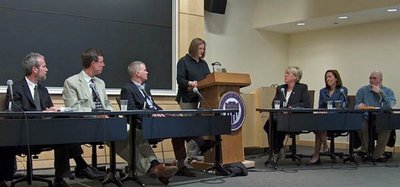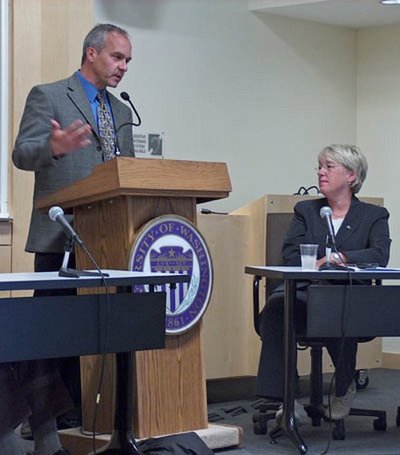August 3, 2006
Raising their voices for stem cell funding
Elizabeth Lowry
News & Community Relations
For most of her life, Sen. Patty Murray’s father was confined to a wheelchair. Multiple sclerosis robbed her father of his independence. And it stole a normal life from Murray, her siblings and her stay-at-home mother, who was forced to work to provide for her seven children and husband.
For Murray, the fight for federal funding for stem cell research is personal.
“I can only sit here today and wonder how my family’s lives would have been different if there had been a cure for MS,” she said last week. Murray spoke at a press conference in the William H. Foege Hall following President Bush’s veto of legislation that would have provided federal funding for expanded stem cell research. The president, Murray said, has “tied the hands of science and delayed hope” for millions of patients and their families.
Murray was joined by Sen. Maria Cantwell, UW President Mark Emmert and Dr. Paul Ramsey, dean of the School of Medicine and vice president for medical affairs. Also speaking were Dr. Randy Moon, director of the UW Institute for Stem Cell and Regenerative Medicine, and associate directors Drs. Chuck Murry and Tony Blau.
The UW is using 14 of the 21 federally-approved stem cell lines. But the existing lines — the youngest of which is five years old — won’t last forever. And as they age, they lose their quality and regenerative properties. Blau compared it to using a five-year-old computer. The doctors said they need access to new lines of stem cells and federal money to find the cure for diseases like heart disease, hearing loss and cancer.
About 70 researchers are involved in stem cell research through the UW Institute for Stem Cell and Regenerative Medicine. In fiscal year 2005, UW medical faculty received $539 million in National Institutes of Health research awards. Total research funding from federal sources, private foundations, industry and other non-federal sources approached $800 million.
Federal money can only be used for research on embryonic stem-cell lines created before Aug. 9, 2001, when President Bush changed federal policy. He encourages scientists to pursue research using adult cells.
But stem cells from adults, scientists agree, simply do not have the same potential as embryonic stem cells. Adult stem cells are not as flexible. By working with embryonic stem cells, scientists can program the cells to be anything from heart muscle to brain tissue.
For patients like Alex Goldberg, a 21-year-old with a longstanding history of heart failure, stem cell research may hold the key to a better quality of life. After a lifetime marked by flares of heart failure and advanced treatments, his heart problems have stabilized. Yet, each day he takes three doses of medications, with nine pills for each dose.
“If they could get me off one drug, my life will be immeasurably improved,” he said. Goldberg is producing a documentary on the Murry Lab and stem cell research at the UW.
For Parkinson’s patient and former UW employee Carey Christensen, the clock is ticking. Diagnosed seven years ago with Parkinson’s disease at the age of 41, Christensen lost, in order, her husband, job, health insurance, house and car.
But she still has her voice. Now on social security, she spends her days monitoring stem cell research legislation and advocating for Parkinson’s disease.
“I haven’t lost my mind,” she said.
Nor has she completely lost hope. She was heartened by the senators’ show of support.
“We’ve all been cheated, but not defeated,” she said.
Learn more on The 10 Show:
Learn more about stem cell research at the UW by watching The 10 Show, a Webcast on www.on10.net, a Microsoft Web site that highlights how technology is changing lives across America. The program on stem cell research will be Webcast in the next couple of weeks.
Other UW projects profiled on the site have included the UW Institute for Surgical and Interventional Simulation, and how virtual reality can help claustrophobic patients undergoing MRI tests.


